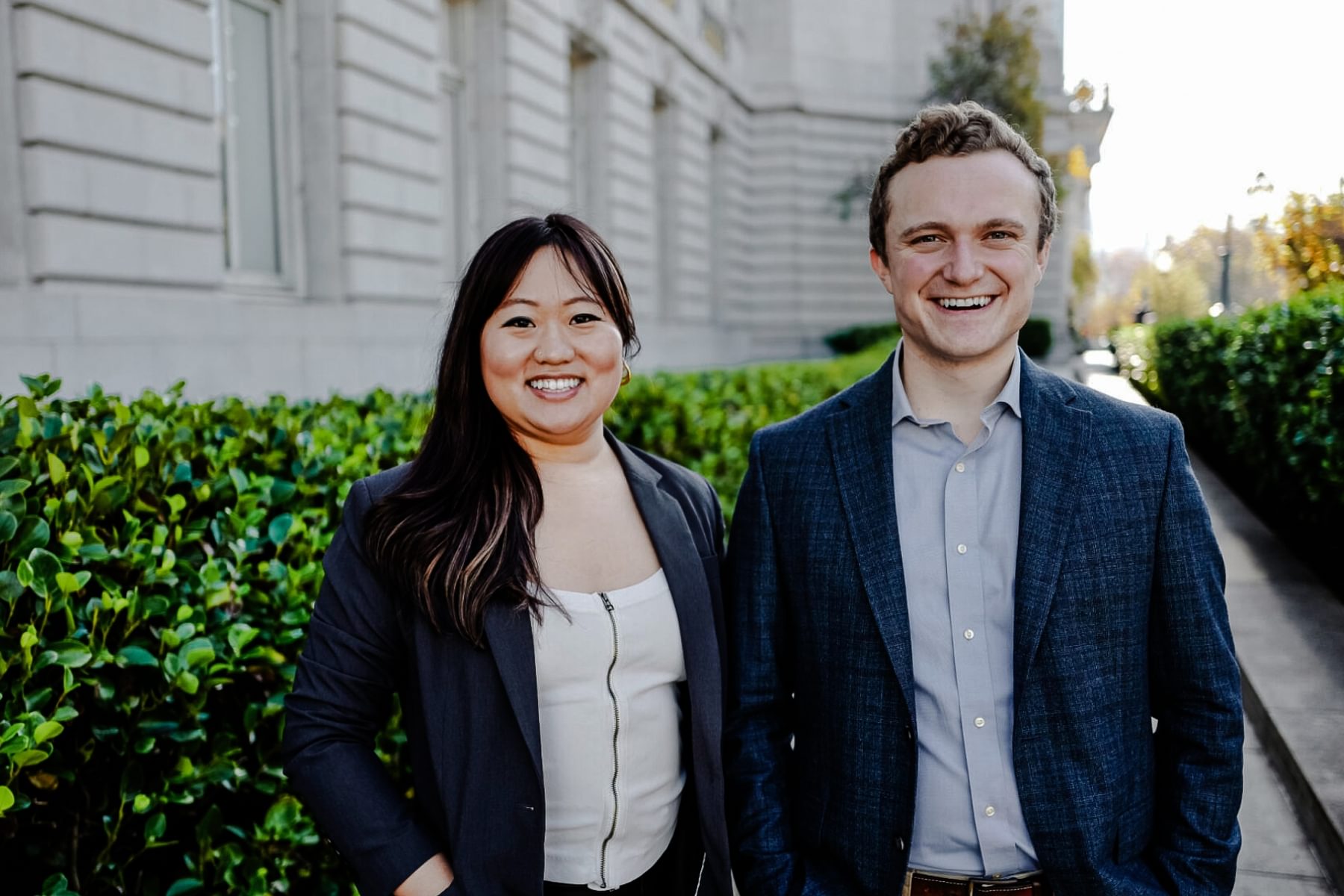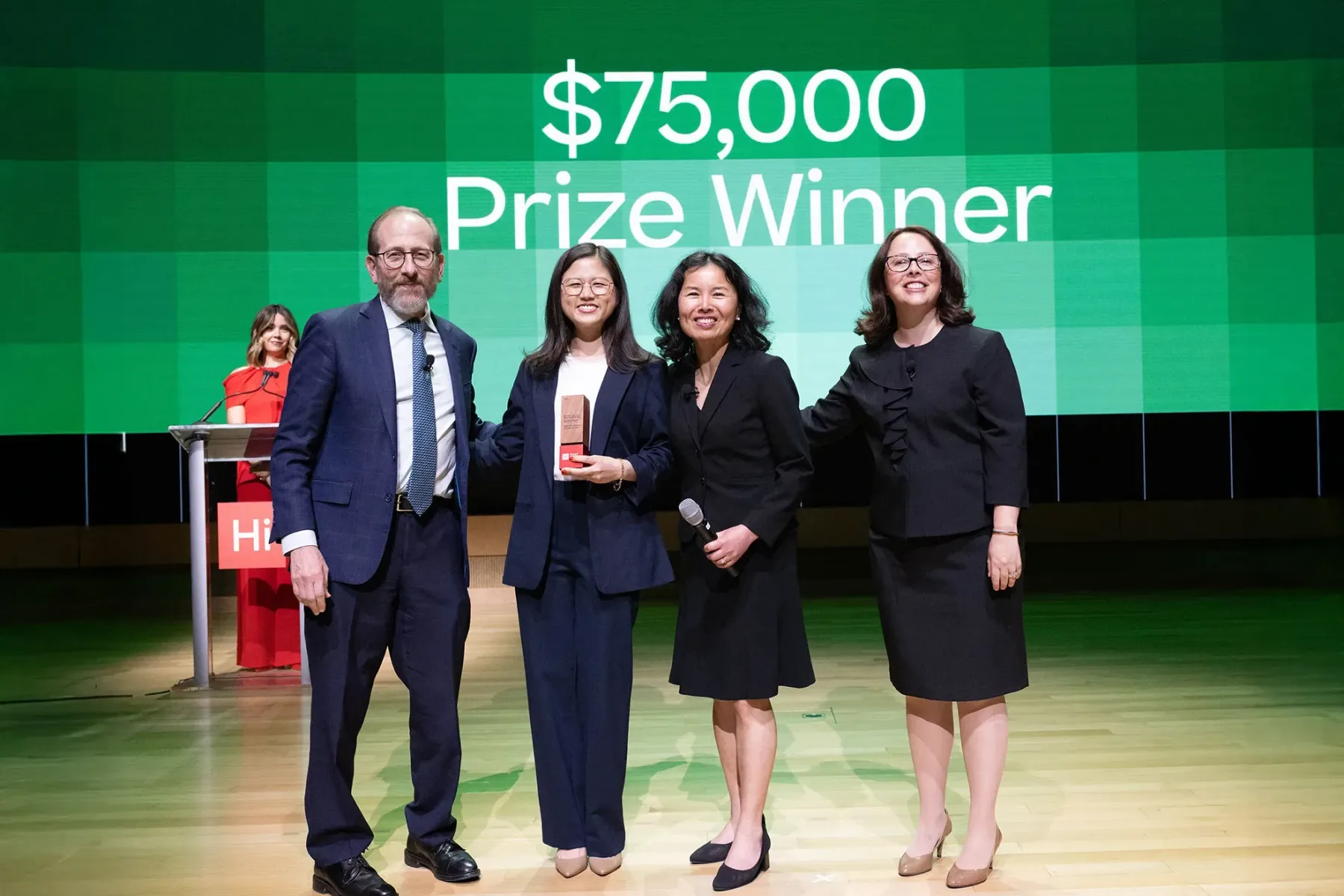In the fall of 2023, as tensions heightened at Harvard and nationwide in the wake of October 7, Shira Hoffer (Harvard College ’25) wanted to help. Even in an academic environment like Harvard, defined by learning and intellectual curiosity, she noticed that people were scared to ask simple questions about the crisis in the Middle East. So she met the need for a nonjudgmental information source by setting up the Hotline for Israel/Palestine. Almost a year later, the hotline is just one arm of her nonprofit, the Institute for Multipartisan Education.
The Institute for Multipartisan Education offers educational consulting and resource development for middle schools and high schools, and a fellowship for university student leaders. Its programming is aimed at making a shift toward open-mindedness and active listening, improving community dynamics, and helping students build skills that will serve them for life. With the consulting work underway, and plans to launch the college student fellowship next year, Shira and her team — alongside a dedicated advisory board and a group of affiliated faculty — are chipping away at the corrosive cultural attitude that “different” must mean “bad."
A Background in Building Tolerance
A Social Studies and Religion concentrator writing her thesis on religious students’ relationship to campus speech culture, Shira’s interest in ideological diversity is embedded in her background. She attended Gann Academy, a Jewish high school that emphasizes the validity of all forms and levels of religious observance. Gann’s focus on pluralism builds a culture that celebrates proactive engagement with diverse perspectives, a value Shira brought with her to Harvard College.
Arriving at Harvard in 2020, Shira sought out similar opportunities beyond the classroom to complement her studies. She joined the Interfaith Forum, a student organization that convened religious students on campus for educational and cultural opportunities, participated in the Intercollegiate Civil Disagreement Partnership Fellowship at the Edmund & Lily Safra Center for Ethics, and trained as a volunteer courtroom mediator through Harvard Law School’s Mediation Program.
In 2023, when polarization and misinformation quickly became dominant themes in America’s reaction to the Israel-Gaza war, Shira was ready to get to work. “I felt like I had the background and the skills to be able to do something about this,” she says. “I've benefited so much from being able to have curious conversations with people who I disagree with, and I think that it's something that everybody should experience.”
The Israel/Palestine Hotline was a speedy success, taking questions via texting from hundreds of users and sparking respectful, fact-based engagement with a range of perspectives across the country. But while the hotline met an urgent need, it only scratched the surface of Shira’s broader mission: helping young people learn to interact curiously and thoughtfully in any context with those whose viewpoints they oppose.
I've benefited so much from being able to have curious conversations with people who I disagree with, and I think that it's something that everybody should experience."
Expanding the Vision
When Shira and her team incorporated the hotline, they did so under the name Institute for Multipartisan Education, Inc, D.B.A. the Hotline for Israel/Palestine: a mouthful, but necessary if the organization were to ever expand its purpose. And expansion came sooner than expected.
Shortly after launching the hotline, a text came in from a middle school principal asking for support in navigating discussions around the Gaza war in her school. This serendipitous conversation was the perfect catalyst for making broader change around how to engage across ideological differences, and thus the Institute for Multipartisan Education was born.
Shira was asked to lead three days of workshops for students, teachers, and parents. “At first I said, ‘no way!’” Shira reflected. “I told them I was flattered, but that they should hire someone with more experience than me. But because I was close in age to their students, they thought my perspective would make a big difference in the buy-in power of the lessons.” This was an eye-opening comment that came to define the Institute for Multipartisan’s theory of change.
This hands-on success at the Headwaters School marked a milestone for the Institute. “On one hand, I was like ‘Wow, I love doing this. This is so great,’” says Shira. But the pilot also helped her realize what to work on next. “On the other hand, I was like, ‘who am I and what am I doing in Texas?’ And I felt like I needed to learn a lot more.”
Understanding Universal Needs
Shira and her budding team now had a new theory of change: an in-depth, student-led educational approach, aimed at fostering a curious approach to ideological challenges. The team conducted a landscape analysis, assessing existing groups and initiatives with similar missions to identify gaps in the field and fundamental needs. Four pillars emerged, grounded in psychology, conflict resolution, and civics education:
Sustainability: Ensuring that the Institute’s core values and material are reinforced consistently to create lasting change.
Tailored Intervention: Customizing workshops and interventions to meet the specific needs of different groups at particular moments.
Student Leadership: Empowering students to internalize the skills and theories they learn and then pass them on to peers.
In-Person Work: Emphasizing the importance of face-to-face interaction for effective and meaningful engagement.
These pillars are helping construct the Institute's next big project: an undergraduate fellowship program, the Multipartisan Leaders Training Initiative (MLTI), set to launch in fall 2025. MLTI is “unique in that it employs a student-driven, train-the-trainer model,” says Shira. “We’re bringing in student leaders to ultimately send them back to their communities.”
We’re bringing in student leaders to ultimately send them back to their communities.”
The fellowship will begin with an intensive in-person bootcamp rooted in the research that she and her eight interns conducted this summer. It will continue with remote mentorship for fellows designing custom interventions for their campus organizations, and culminate in a university-wide, fellows-designed capstone project designed to engage peers in their learning.
The throughline between middle school workshops and college-level initiatives like MLTI underscores a key point: the skills required to successfully navigate differences are universal, though how they are taught requires adaptation. For sixth graders, this might mean designing games and activities around listening, while college seniors may dive deep into discussions about identity, ideology, and civic responsibility. But the core skills around listening, asking questions, and regulating emotions — as well as the principles of curiosity and respect — are critical for every age.
Challenges and Connections
Starting any venture is tough, but nonprofits come with a special set of challenges. It’s no surprise that fundraising is one of them. “It’s been a steep learning curve,” Shira reflects. “I've had meetings with several foundations who are big funders in this space, who have been really generous with their time.” But because the Institute for Multipartisan Education is such a young organization, it’s been difficult to secure gifts from these major foundations.
“We're really looking for individuals who are willing to take a chance on us, or small family foundations who have fewer restrictions around fundraising,” says Shira. The Institute has identified a pilot college campus, but needs to raise $65,000 by December for the MLTI fellowship to be viable by next year. “We've raised about $25,000 so far, which is great,” she says. “But we still have a ways to go.”
With this timeline in mind, Shira began exploring resources for Harvard entrepreneurs this spring. A friend recommended the i-lab and the opportunities it offers founders to seek tailored advice from industry experts. Shira met with Rebekah Emanuel, Senior Advisor for Social Impact, to learn about new funding opportunities and best practices for navigating the nonprofit environment. After attending some initial office hours sessions, Shira officially became an i-lab member this summer and plans to deepen her involvement throughout the academic year, with the goal of working full-time on her venture after graduation.
What pumps Shira up most about the i-lab? The community. Despite her extracurricular engagement in her first three years at Harvard, “I don't know any other social entrepreneurs. At least, I don't know that I know them,” Shira says. “I'm excited to connect with other people working on social ventures, learn from their experiences, and feel less isolated in this strange world of being a startup founder and a student at the same time.”
I'm excited to connect with other people working on social ventures, learn from their experiences, and feel less isolated in this strange world of being a startup founder and a student at the same time.”





